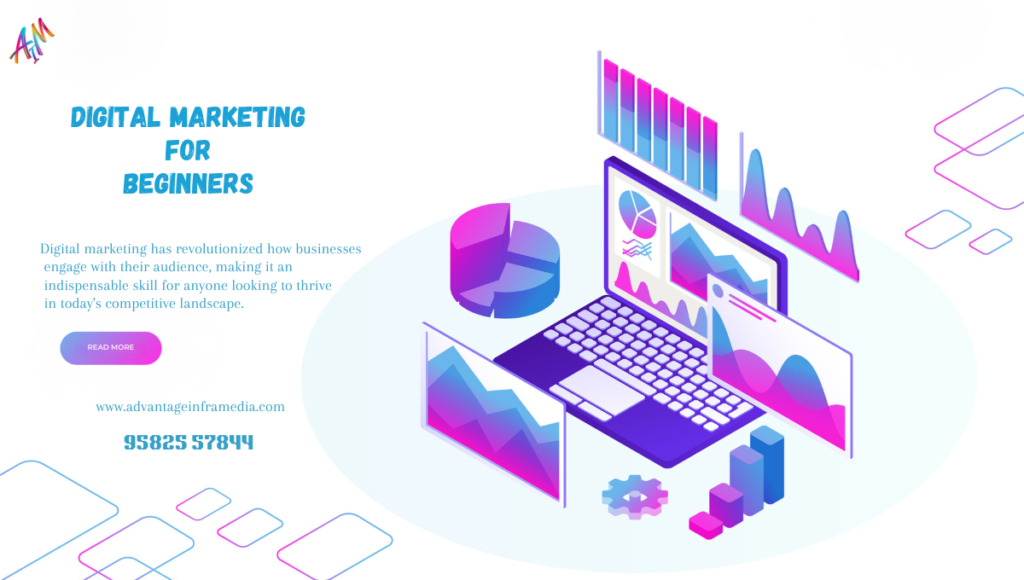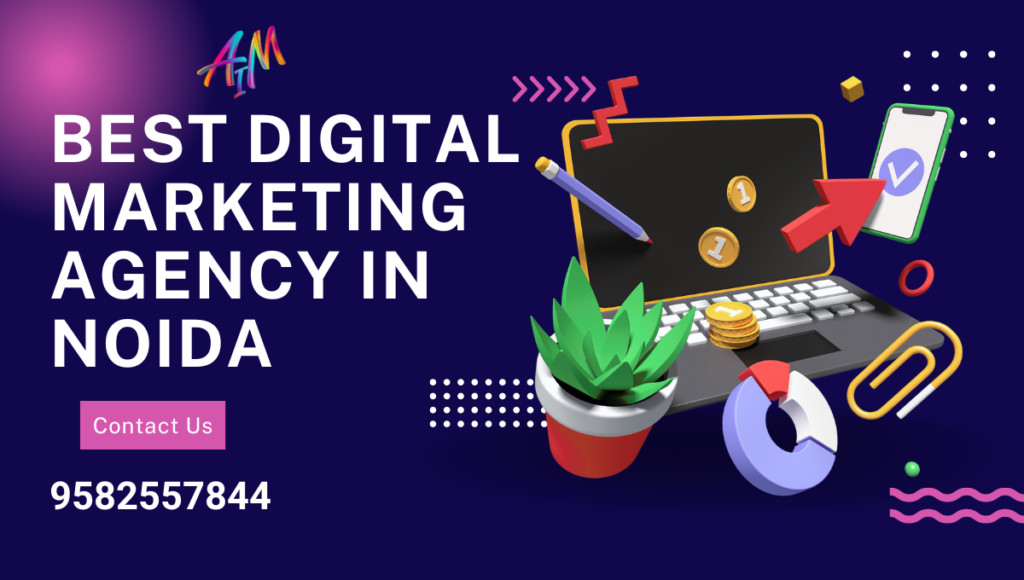Digital marketing has revolutionized how businesses engage with their audience, making it an indispensable skill for anyone looking to thrive in today’s competitive landscape. If you’re a beginner, stepping into the digital marketing world can seem overwhelming due to the vast array of tools, strategies, and platforms available. However, with the right approach, you can navigate this landscape effectively. This comprehensive guide will walk you through the steps to get started in digital marketing, ensuring you build a solid foundation.
Understanding Digital Marketing
What is Digital Marketing?
Digital marketing encompasses all marketing efforts that use the internet or an electronic device. Businesses leverage digital channels such as search engines, social media, email, and websites to connect with current and prospective customers.
Key Components of Digital Marketing
- Search Engine Optimization (SEO): Enhancing your website to rank higher in search engine results pages.
- Content Marketing: Creating valuable content to attract and engage an audience.
- Social Media Marketing: Using social media platforms to promote products or services.
- Pay-Per-Click (PPC): Paying for ads to drive traffic to your website.
- Email Marketing: Sending targeted emails to nurture leads and engage customers.
- Affiliate Marketing: Earning a commission by promoting other people’s products.
- Influencer Marketing: Collaborating with influencers to promote your brand.
Setting the Foundation
Define Your Goals
Before diving into digital marketing, it’s crucial to define your goals. Are you looking to increase brand awareness, drive website traffic, generate leads, or boost sales? Clear goals will help you measure your success and adjust strategies as needed.
Identify Your Target Audience
Understanding your target audience is fundamental. Create buyer personas to represent your ideal customers. Consider demographics, interests, online behavior, and pain points. This will guide your marketing efforts and ensure you reach the right people.
Build a Strong Online Presence
- Create a Website: Your website is the cornerstone of your digital marketing efforts. Ensure it’s user-friendly, mobile-optimized, and SEO-friendly.
- Start a Blog: A blog helps in sharing valuable content, improving SEO, and establishing your authority in your niche.
- Set Up Social Media Profiles: Choose platforms where your audience is most active. Ensure your profiles are complete and consistently branded.
Learning the Tools and Techniques
Search Engine Optimization (SEO)
SEO is crucial for improving your website’s visibility on search engines. It involves optimizing both on-page and off-page elements.
- On-Page SEO: Focus on keyword research, quality content, meta tags, and internal linking.
- Off-Page SEO: Build backlinks from reputable websites, engage in social media, and guest blog on high-authority sites.
Content Marketing
Content marketing involves creating and distributing valuable content to attract and engage your target audience.
- Blog Posts: Write informative articles relevant to your audience’s interests and pain points.
- Ebooks and Whitepapers: Offer in-depth information in exchange for contact details, aiding lead generation.
- Videos: Create engaging videos to explain products, share tips, or showcase customer testimonials.
- Infographics: Use visually appealing graphics to simplify complex information.
Social Media Marketing
Social media platforms are excellent for connecting with your audience, promoting your content, and driving traffic to your website.
- Choose the Right Platforms: Focus on platforms where your target audience is most active (e.g., Facebook, Instagram, LinkedIn, Twitter).
- Engage with Your Audience: Respond to comments, participate in conversations, and share user-generated content.
- Run Paid Campaigns: Use social media advertising to reach a broader audience. Platforms like Facebook and Instagram offer targeted ad options.
Pay-Per-Click (PPC) Advertising
PPC advertising, such as Google Ads, allows you to pay for clicks on your ads, driving traffic to your website.
- Keyword Research: Identify relevant keywords that potential customers are searching for.
- Create Compelling Ads: Write engaging ad copy with a clear call-to-action.
- Optimize Landing Pages: Ensure the landing pages are relevant to the ads and optimized for conversions.
Email Marketing
Email marketing is a powerful tool for nurturing leads and maintaining customer relationships.
- Build an Email List: Use sign-up forms, lead magnets, and social media to grow your list.
- Segment Your Audience: Divide your list based on demographics, behavior, and preferences to send personalized content.
- Create Engaging Content: Write compelling subject lines and provide valuable content that addresses your audience’s needs.
- Automate Campaigns: Use email marketing tools to automate follow-ups, welcome series, and promotional emails.
Affiliate Marketing
Affiliate marketing involves partnering with other businesses or influencers to promote your products.
- Find Affiliates: Look for partners who have an audience that matches your target market.
- Provide Resources: Give your affiliates the tools they need, such as banners, links, and promotional content.
- Track Performance: Use affiliate tracking software to monitor sales and traffic generated by your affiliates.
Influencer Marketing
Influencer marketing leverages the influence of popular personalities to promote your brand.
- Identify Influencers: Look for influencers whose followers align with your target audience.
- Build Relationships: Engage with influencers by commenting on their posts, sharing their content, and eventually proposing a collaboration.
- Run Campaigns: Work with influencers to create authentic content that promotes your brand.
Measuring and Analyzing Performance
Set Up Analytics
Use tools like Google Analytics to track your website traffic, user behavior, and conversions. Understand which strategies are working and where improvements are needed.
Monitor Key Metrics
- Website Traffic: Track the number of visitors, page views, and session duration.
- Conversion Rates: Measure how many visitors take the desired action (e.g., sign up, purchase).
- Engagement Rates: Monitor likes, comments, shares, and click-through rates on social media and email campaigns.
- Return on Investment (ROI): Calculate the ROI for different marketing campaigns to ensure you’re getting a good return on your spend.
Adjust and Optimize
Use the data you collect to make informed decisions. Continuously test different strategies, refine your tactics, and optimize your campaigns for better results.
Staying Updated and Evolving
Continuous Learning
Digital marketing is constantly evolving. Stay updated with the latest trends, tools, and techniques through:
- Online Courses: Platforms like Coursera, Udemy, and LinkedIn Learning offer courses on various digital marketing topics.
- Blogs and Podcasts: Follow industry blogs and listen to podcasts to keep up with new developments.
- Webinars and Conferences: Attend webinars and conferences to learn from experts and network with other professionals.
Networking
Join online communities, forums, and social media groups related to digital marketing. Networking with other professionals can provide valuable insights and opportunities.
Experimentation
Don’t be afraid to experiment with new strategies and tools. What works for one business might not work for another, so it’s essential to find what works best for you.
Conclusion
Starting with digital marketing can be daunting, but with a structured approach, you can build a strong foundation and gradually expand your skills. Define your goals, understand your audience, and leverage various digital marketing strategies to grow your online presence. Remember, continuous learning and adaptation are key in the ever-evolving digital landscape. Whether you’re a small business owner, a freelancer, or someone looking to switch careers, digital marketing offers endless opportunities to connect with audiences and achieve your objectives. Dive in, experiment, and stay persistent – success in digital marketing is within your reach.




